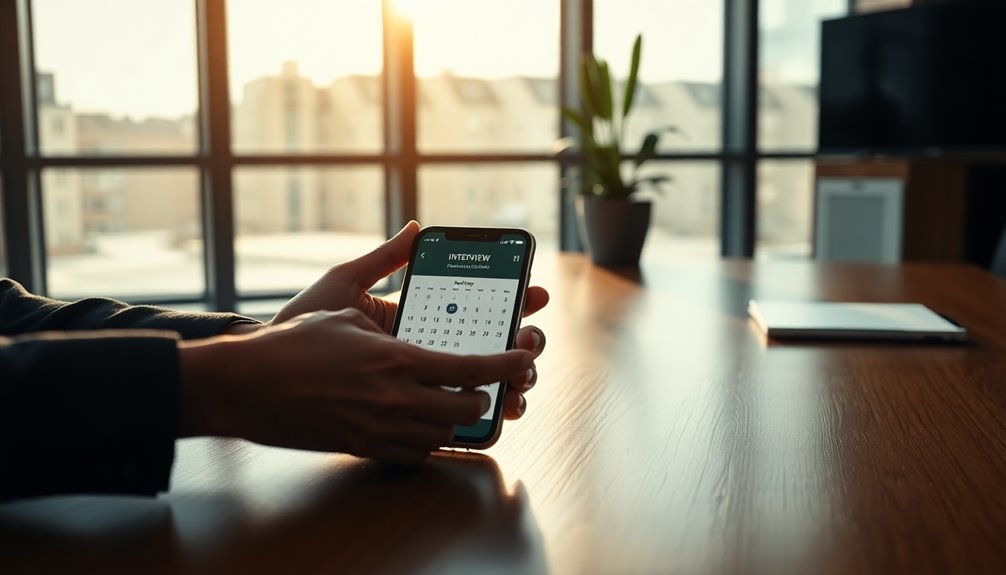Canceling an interview invitation doesn't have to burn bridges. Start by informing the interviewer as soon as you decide to cancel, ideally at least a day ahead. Use a professional tone in an email or a phone call, and keep your message clear and concise. Acknowledge the invitation, express your regret, and briefly explain your reason. Apologize for any inconvenience and express gratitude for the opportunity. If you're interested in the role down the line, consider offering to reschedule. This approach helps keep doors open, allowing you to explore future possibilities in the industry. There's more to master this skill effectively.
Key Takeaways
- Notify the interviewer as soon as possible, ideally giving at least one day's notice to show respect for their time.
- Use a polite and professional tone in your communication, expressing gratitude for the opportunity and apologizing for any inconvenience.
- Provide a brief explanation for your cancellation without going into excessive detail to maintain professionalism.
- Offer to reschedule if appropriate, indicating your continued interest in the position and the company.
- Follow up after the cancellation to keep communication open and express your interest in future opportunities.
Valid Reasons for Cancellation

Sometimes, unexpected events can arise that make it necessary to cancel an interview invitation. You might face serious health issues or an accident that prevents you from attending. Life can throw curveballs, like urgent family matters or even a bereavement, which can make it impossible to focus on the interview at hand. These are valid reasons, and it's important to acknowledge that they can happen to anyone.
On the career front, you may decide to accept another job offer that aligns better with your career objectives. Sometimes, after further reflection, you realize the role isn't a good fit for you or the company's values clash with your own. It's okay to prioritize your career interests and values. Acknowledging that cancellations are common can also help ease any anxiety about the decision.
External circumstances can also play a role in your decision to cancel. Unexpected relocations, inclement weather, or significant family events can disrupt your plans. Even logistical issues, like travel disruptions or sudden scheduling conflicts, can force you to rethink your attendance. Recognizing these valid reasons can help you approach the situation with professionalism and clarity, ensuring you maintain your reputation in the job market.
Timing Your Cancellation

When you need to cancel an interview, timing is essential. Aim to give at least a day's notice whenever possible; two weeks is ideal, especially for residency interviews. This early notification shows respect for the interviewer's time and allows them to adjust their schedule accordingly. It also aids in the rescheduling process, making it easier for everyone involved. Providing proper cancellation notice also helps maintain positive relationships with residency programs.
If you find yourself in an urgent situation and can't provide much notice, a phone call is your best bet. If you have to go the email route, send your message as soon as you make the decision. Regardless of how you communicate, always include an apology and a brief explanation for the cancellation. Immediate notification is vital for last-minute changes.
Choosing Communication Methods

Canceling an interview requires careful consideration of how you communicate your decision. You have a couple of options: email or phone, and each method has its merits. If you choose email, send it as soon as you know you need to cancel. Use a clear subject line like "Interview Cancellation" to grab attention. Include your name, the position, and the scheduled date and time for context. Be concise with your reason for canceling and maintain a professional tone throughout. Best practices for interview cancellation emphasize notifying the employer as soon as the decision is made to show respect for their time.
On the other hand, if you're in a situation where you need to cancel last minute, a phone call is more immediate. If you can't reach the hiring manager, leave a voicemail that includes your name, the position, and your reason for canceling. Follow up with an email to confirm your cancellation and provide any additional details.
If you're unsure, combining both methods can be effective. Call to notify them, then send an email for confirmation. Whatever method you choose, guarantee your message is polite and clear to avoid any confusion and maintain a positive impression.
Crafting the Cancellation Message

Effective communication is essential when crafting a cancellation message for an interview. You want to be clear and polite, ensuring you don't burn bridges. Start by notifying the interviewer as soon as possible, ideally at least a day in advance. Briefly state your reason for cancellation, if applicable, and apologize for any inconvenience caused. Always express gratitude for the opportunity. Timely communication is crucial to maintain positive relationships.
Here's a simple structure to contemplate for your message:
| Step | Details | Example |
|---|---|---|
| Subject Line | Indicate cancellation | Interview Cancellation – [Your Name] |
| Greeting | Address the interviewer by name | Dear [Interviewer’s Name], |
| Cancellation Reason | Briefly state your reason | I need to cancel our interview due to… |
| Closing | Thank them and sign off | Thank you for your understanding. Best, [Your Name] |
Keep your message concise—no more than 10 sentences. Respect the interviewer’s time by avoiding unnecessary details. If you’re still interested in the position, offer to reschedule. This approach fosters goodwill and keeps the door open for future opportunities. Remember to express gratitude for the opportunity to interview, and reiterate your enthusiasm for the role. Finally, mention that you are open to any feedback or suggestions for improvement to increase job search success. This approach shows professionalism and leaves a positive impression, even if you are unable to move forward in the current hiring process.
Maintaining Professionalism

In any communication regarding an interview cancellation, maintaining professionalism is key to preserving your reputation and potential future opportunities. Your approach can greatly influence how the interviewer perceives you, even if the interview doesn't happen.
Here are three essential tips to keep in mind:
1. Use the Right Communication Channel****
Respond using the same method as the cancellation notice. If they emailed you, reply via email for a written record. Phone calls are great for imminent interviews or if you've established a rapport.
2. Express Gratitude and Acknowledgment
Thank the interviewer for their time and effort. Acknowledge their understanding of your situation, which shows you value their consideration. Additionally, organizational restructuring may lead to changes in the hiring process, so expressing flexibility can demonstrate your adaptability.
3. Be Polite and Respectful
Maintain a professional tone, regardless of your feelings about the cancellation. Stay solution-oriented and positive, as this reflects your adaptability and professionalism.
Avoiding Common Mistakes

When you need to cancel an interview, avoiding common mistakes can help you maintain a positive impression. First, inform the employer as soon as possible. Aim to give at least 24 hours' notice so they can adjust their schedule accordingly. Last-minute cancellations can lead to frustration and leave a bad impression, so respect their time.
Next, be clear but concise about your reason for canceling. You don't need to go into great detail; simply stating "personal emergency" or "accepted another job offer" suffices. This honesty maintains professionalism while avoiding unnecessary complications. Remember, it is ideal to provide at least a week's notice when canceling an interview.
Failing to follow up can also hurt your reputation. After you cancel, send a follow-up email to confirm your message was received. If you don't get a response, don't hesitate to make a quick phone call. Confirmation helps clarify communication and shows respect for the employer's time.
Lastly, verify your communication is respectful. Avoid impulsive cancellations and apologize for any inconvenience caused. Using formal methods, like email or phone calls, enhances your professionalism. Remember, multiple last-minute cancellations can seriously damage your chances for future opportunities.
Frequently Asked Questions
How Can I Politely Decline a Job Interview Invitation?
To politely decline a job interview invitation, respond promptly, ideally within 48 hours. Start by expressing gratitude for the opportunity and the recruiter's time. Keep your message direct and professional, clearly stating your decision without unnecessary details. If possible, suggest another candidate who might be a good fit. Finally, end on a positive note, leaving the door open for future opportunities and maintaining a professional connection.
Is It Okay to Cancel an Interview After Accepting?
Yes, it's okay to cancel an interview after accepting, but you should handle it with care. As soon as you decide, let the interviewer know, ideally at least a day in advance. Apologize for any inconvenience and express gratitude for the opportunity. If you're still interested, consider asking to reschedule. Keeping the communication respectful shows professionalism and helps maintain a positive relationship for future opportunities.
What if I Change My Mind About Canceling?
If you change your mind about canceling, it's important to act fast. Inform the employer as soon as possible, as they might have already moved on. A formal email or call is best. Apologize for the inconvenience, explain your change of heart, and express gratitude for the opportunity. Suggest specific dates for rescheduling, showing flexibility. This can reflect positively on your interest, but avoid making this a habit.
How Will Cancellation Affect My Reputation With the Company?
Canceling an interview can greatly impact your reputation with the company. If you don't handle it professionally, you might leave a negative impression, suggesting a lack of reliability. Companies often remember candidates who cancel last-minute without valid reasons. However, if you communicate promptly and respectfully, you can mitigate the damage and keep future opportunities open. Providing a valid reason, even briefly, helps maintain a positive relationship and shows you value their time.
Can I Ask for Feedback After Canceling an Interview?
Absolutely, you can ask for feedback after canceling an interview! Just imagine how enlightening it could be to gain insights that transform your future performances! When you do, make sure it's polite and respectful. Wait a few days after your cancellation, then reach out briefly, expressing gratitude for the opportunity. Keep it concise and professional, as this shows you value their time. Remember, feedback is a gift, so be open to whatever they share!
Conclusion
In conclusion, canceling an interview doesn't have to be a disaster. By understanding valid reasons, choosing the right timing, and communicating professionally, you can maintain valuable connections. For instance, if you receive a dream job offer just before an interview, politely canceling can keep doors open for future opportunities. Remember, it's not just about the immediate situation—it's about fostering lasting relationships in your career. Handle the cancellation gracefully, and you'll leave a positive impression.









